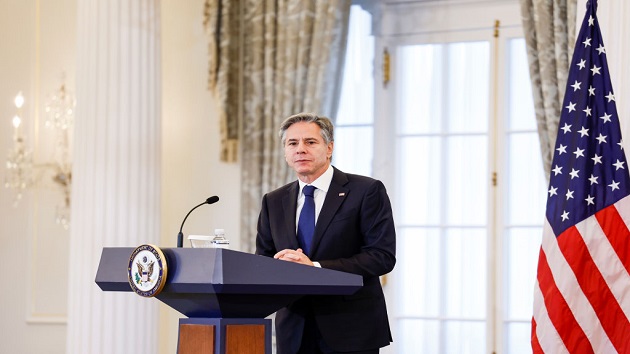(WASHINGTON) — The impact of the phone call between President Joe Biden and Israeli Prime Minister Benjamin Netanyahu was still being felt Friday as Israel responded to Biden’s demand for accountability in the wake of the Israeli strike on the World Central Kitchen convoy that killed seven aid workers.
Secretary of State Antony Blinken, attending a NATO meeting in Brussels, was dialed into Thursday’s call at one of the most stressful points in the increasingly fraught relationship between the two allies.
As the ABC News State Department Producer, I was traveling with Blinken and have this account and analysis:
Behind the scenes before the call
Ahead of the conversation, the tension in the air was palpable — and it continued to build throughout the day.
Even though the call was on President Biden’s calendar, Blinken began the day planning for a full program at NATO’s headquarters. But then he missed a scheduled event and barely squeaked into another (he often runs behind schedule, but not on this level) .
Blinken also left a group meeting on Ukraine more than half an hour before it concluded, opting to hole up in a private meeting room instead. (He also outwardly appeared to be in a bad mood — another rarity.)
By mid-afternoon local time, it became clear that preparing for the Netanyahu call had become and all-hands-on-deck situation — and a chaotic one. Amid a frenzy of high-level calls, administration officials in Brussels and Washington struggled to get on the same page, according to sources familiar with the matter.
While these calls are quite often high stakes, usually working level engagement sets at least a rough expectation. Not so this time, officials said — they were flying blind, with no idea how Netanyahu would react.
Officials described the call itself as fairly grueling, but said they walked away confident they had secured at least one win — a promise from the Israelis to open up a number of portals into Gaza for humanitarian aid, as was announced not long after. (U.S. officials had been pushing for the Erez crossing on Gaza’s northern border with Israel in particular to be opened for months but had seen no apparent progress until this point.)
But there’s a challenging road ahead.
Uncertain stakes
After the call, Blinken shed remarkably little light on the situation during his news conference (even by his careful diplomatic standards) declining to say any more on what the administration might do if Israel doesn’t meet U.S. demands.
Diplomats often employ strategic ambiguity with allies and enemies alike, the argument for it being that if you keep expectations and potential consequences vague and you might get better results than if you spelled them out.
That could be at play here, but if so, it’s only part of the story. Officials say key figures within the administration hold a wide range of positions regarding potential repercussions, challenging the U.S.’ ability to form a cohesive strategy.
Cease-fire call
The White House readout of the call is the strongest statement from the administration delinking a cease-fire and a deal for the release of hostages in Gaza.
About six weeks ago, administration officials insisted that doing so would take all the air out of negotiations.
When I asked Blinken about this, he was vague, but an official says blurring the connection between the two has been a deliberate push and one directed by the White House.
Blinken also dodged on whether the administration sees Netanyahu as a limiting step for reaching an agreement, which is heavily implied by the president urging the prime minister “to empower his negotiators to conclude a deal without delay.”
This would be a shift, too. Up until very recently, administration officials insisted Netanyahu was empowering his negotiators.
Regardless, sources familiar with negotiations say Hamas is still a big hurdle — and that despite intermediaries’ confidence that its leaders will back off demands that would allow the group to remain in power after the conflict, it hasn’t come to fruition.
What has changed?
The secretary was first asked on Tuesday about the World Central Kitchen strike shortly after it happened — and hours before the White House, the president and the Secretary of Defense Lloyd Austin expressed their outrage over the deadly attack.
The French foreign minister was standing beside Blinken at the time and expressly condemned the strike, but the secretary was much more muted. He urged an investigation and voiced his grief over the deaths of the aid workers–but no outrage, no condemnation.
When I asked him what had changed on Thursday, I was expecting him to say that time had allowed the administration to evaluate the incident and come to a conclusion.
But instead, he responded by declaring that nothing changed — insisting he was outraged from the jump but was initially motivated by “focusing on the human beings involved” – and for some unexplained reason couldn’t take it a step further with condemnation for the act that killed them.
“I was focused on the — the people, the individuals who had lost their lives, given their lives in service of their fellow human beings. That was what was motivating me in those initial comments,” he said. “And I thought it was important as well to put the focus on that.”
Copyright © 2024, ABC Audio. All rights reserved.












